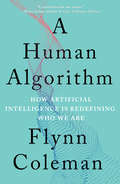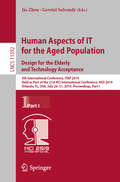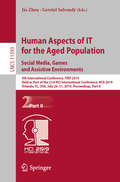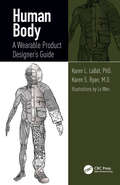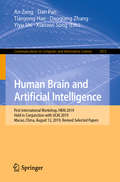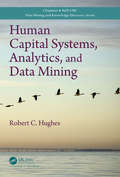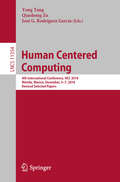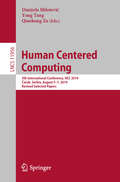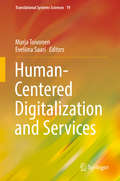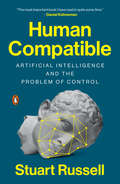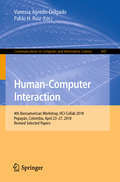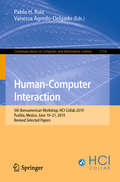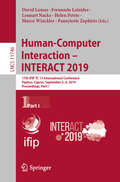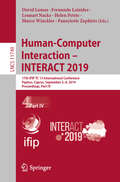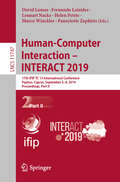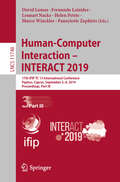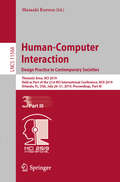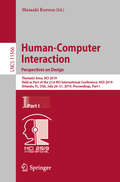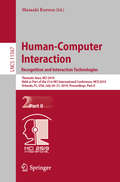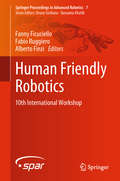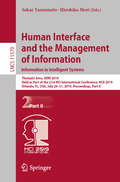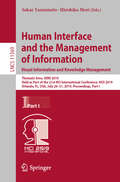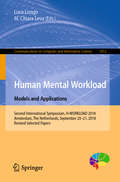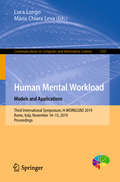- Table View
- List View
A Human Algorithm: How Artificial Intelligence Is Redefining Who We Are
by Flynn ColemanA groundbreaking narrative on the urgency of ethically designed AI and a guidebook to reimagining life in the era of intelligent technology.The Age of Intelligent Machines is upon us, and we are at a reflection point. The proliferation of fast–moving technologies, including forms of artificial intelligence akin to a new species, will cause us to confront profound questions about ourselves. The era of human intellectual superiority is ending, and we need to plan for this monumental shift.A Human Algorithm: How Artificial Intelligence Is Redefining Who We Are examines the immense impact intelligent technology will have on humanity. These machines, while challenging our personal beliefs and our socioeconomic world order, also have the potential to transform our health and well–being, alleviate poverty and suffering, and reveal the mysteries of intelligence and consciousness. International human rights attorney Flynn Coleman deftly argues that it is critical that we instill values, ethics, and morals into our robots, algorithms, and other forms of AI. Equally important, we need to develop and implement laws, policies, and oversight mechanisms to protect us from tech’s insidious threats.To realize AI’s transcendent potential, Coleman advocates for inviting a diverse group of voices to participate in designing our intelligent machines and using our moral imagination to ensure that human rights, empathy, and equity are core principles of emerging technologies. Ultimately, A Human Algorithm is a clarion call for building a more humane future and moving conscientiously into a new frontier of our own design.“[Coleman] argues that the algorithms of machine learning––if they are instilled with human ethics and values––could bring about a new era of enlightenment.” —San Francisco Chronicle
Human Aspects of IT for the Aged Population. Design for the Elderly and Technology Acceptance: 5th International Conference, ITAP 2019, Held as Part of the 21st HCI International Conference, HCII 2019, Orlando, FL, USA, July 26-31, 2019, Proceedings, Part I (Lecture Notes in Computer Science #11592)
by Jia Zhou Gavriel SalvendyThis two-volume set LNCS 11592 and 11593 constitutes the refereed proceedings of the 5th International Conference on Human Aspects of IT for the Aged Population, ITAP 2019, held in July 2019 as part of HCI International 2019 in Orlando, FL, USA. HCII 2019 received a total of 5029 submissions, of which 1275 papers and 209 posters were accepted for publication after a careful reviewing process. The 86 papers presented in these two volumes are organized in topical sections named: Design with and for the Elderly, Aging and Technology Acceptance, Aging and the User Experience, Elderly-Specific Web Design, Aging and Social Media, Games and Exergames for the Elderly, Ambient Assisted Living, Aging, Motion, Cognition, Emotion and Learning.
Human Aspects of IT for the Aged Population. Social Media, Games and Assistive Environments: 5th International Conference, ITAP 2019, Held as Part of the 21st HCI International Conference, HCII 2019, Orlando, FL, USA, July 26-31, 2019, Proceedings, Part II (Lecture Notes in Computer Science #11593)
by Jia Zhou Gavriel SalvendyThis two-volume set LNCS 11592 and 11593 constitutes the refereed proceedings of the 5th International Conference on Human Aspects of IT for the Aged Population, ITAP 2019, held in July 2019 as part of HCI International 2019 in Orlando, FL, USA. HCII 2019 received a total of 5029 submissions, of which 1275 papers and 209 posters were accepted for publication after a careful reviewing process. The 86 papers presented in these two volumes are organized in topical sections named: Design with and for the Elderly, Aging and Technology Acceptance, Aging and the User Experience, Elderly-Specific Web Design, Aging and Social Media, Games and Exergames for the Elderly, Ambient Assisted Living, Aging, Motion, Cognition, Emotion and Learning.
Human Body: A Wearable Product Designer's Guide
by Karen L. LaBat Karen S. RyanHuman Body: A Wearable Product Designer's Guide, unlike other anatomy books, is divided into sections pertinent to wearable product designers. Two introductory chapters include many definitions, an introduction to anatomical terminology, and brief discussions of the body's systems, setting the stage for the remaining chapters. The book is extensively referenced and has a large glossary with both anatomical and design terms making it maximally useful for interdisciplinary collaborative work. The book includes 200 original illustrations and many product examples to demonstrate relationships between wearable product components and anatomy. Exercises introduce useful anatomical, physiological, and biomechanical concepts and include design challenges. Features Includes body region chapters on head and neck, upper torso and arms, lower torso and legs, the mid-torso, hands, feet, and a chapter on the body as a whole Contains short sections on growth and development, pregnancy, and aging as well as sections on posture, gait, and designing total body garments Describes important regional muscles and their actions as well as joint range of motion (ROM) definitions and data with applications to designing motion into wearable products Presents appendices correlating to each body region’s anatomy with instructions for landmarking and measuring the body, a valuable resource for a lifetime of designing
Human Brain and Artificial Intelligence: First International Workshop, HBAI 2019, Held in Conjunction with IJCAI 2019, Macao, China, August 12, 2019, Revised Selected Papers (Communications in Computer and Information Science #1072)
by An Zeng Dan Pan Tianyong Hao Daoqiang Zhang Yiyu Shi Xiaowei SongThis book constitutes the refereed proceedings of the workshop held in conjunction with the 28th International Conference on Artificial Intelligence, IJCAI 2019, held in Macao, China, in August 2019: the First International Workshop on Human Brain and Artificial Intelligence, HBAI 2019. The 24 full papers presented were carefully reviewed and selected from 62 submissions. The papers are organized according to the following topical headings: computational brain science and its applications; brain-inspired artificial intelligence and its applications.
Human Capital Systems, Analytics, and Data Mining (Chapman & Hall/CRC Data Mining and Knowledge Discovery Series)
by Robert C. HughesHuman Capital Systems, Analytics, and Data Mining provides human capital professionals, researchers, and students with a comprehensive and portable guide to human capital systems, analytics and data mining. The main purpose of this book is to provide a rich tool set of methods and tutorials for Human Capital Management Systems (HCMS) database modeling, analytics, interactive dashboards, and data mining that is independent of any human capital software vendor offerings and is equally usable and portable among both commercial and internally developed HCMS. The book begins with an overview of HCMS, including coverage of human resource systems history and current HCMS Computing Environments. It next explores relational and dimensional database management concepts and principles. HCMS Instructional databases developed by the Author for use in Graduate Level HCMS and Compensation Courses are used for database modeling and dashboard design exercises. Exciting knowledge discovery and research Tutorials and Exercises using Online Analytical Processing (OLAP) and data mining tools through replication of actual original pay equity research by the author are included. New findings concerning Gender Based Pay Equity Research through the lens Comparable Worth and Occupational Mobility are covered extensively in Human Capital Metrics, Analytics and Data Mining Chapters.
Human Centered Computing: 4th International Conference, HCC 2018, Mérida, Mexico, December, 5–7, 2018, Revised Selected Papers (Lecture Notes in Computer Science #11354)
by Yong Tang Qiaohong Zu José G. Rodríguez GarcíaThis book constitutes thoroughly reviewed, revised and selected papers from the 4th International Conference on Human Centered Computing, HCC 2018, held in Merida, Mexico, in December 2018. The 50 full and 18 short papers presented in this volume were carefully reviewed and selected from a total of 146 submissions. They focus on a "hyper-connected world", dealing with new developments in artificial intelligence, deep learning, brain-computing, etc.
Human Centered Computing: 5th International Conference, HCC 2019, Čačak, Serbia, August 5–7, 2019, Revised Selected Papers (Lecture Notes in Computer Science #11956)
by Danijela Milošević Yong Tang Qiaohong ZuThis book constitutes thoroughly reviewed, revised and selected papers from the 5th International Conference on Human Centered Computing, HCC 2019, held in Čačak, Serbia, in August 2019. The 48 full and 23 short papers presented in this volume were carefully reviewed and selected from a total of 133 submissions. The papers focus on deep learning and its applications on a variety of real-life problems, ranging from image/video analysis, to human-computer interaction, and to logistics and supply chain management.
Human-Centered Digitalization and Services (Translational Systems Sciences #19)
by Marja Toivonen Eveliina SaariThis book provides a timely overview of the impacts of digitalization from the perspective of everyday life, and argues that one central issue in digitalization is the development of new types of services that digitalization enables, but which are often overlooked due to the focus on new technologies and devices. The book summarizes the past 20 years of research into the relationship between information and communications technology (ICT) and service innovation, and reveals that the ongoing digitalization is a qualitatively different phenomenon and represents a true paradigm shift.The all-encompassing integration and distribution of data raises critical issues such as preserving human dignity and individual autonomy; moreover, interaction practices that foster broad participation, trust, learning, and a willingness to share knowledge are called for. Citizen empowerment and multi-actor co-creation have become central to using digitalization to support the development of wellbeing and sustainability.Further, the book shows how employees and professionals can and should be involved in designing their future work, and in evaluating it. Proactiveness and participation in innovation endeavours are ways to guarantee meaningful work in an age of socio-technical transition.The book employs a variety of theoretical approaches and perspectives from diverse disciplines to illustrate these needs. In addition to theoretical analyses, some specific application areas are examined, e.g. services in health and social care, and problems linked to robots in elderly care. Given its scope, the book is highly recommended to all readers seeking an overview of the current understanding of the human side of digitalization and searching for concrete cases from different countries to illustrate the topic.
Human Compatible: Artificial Intelligence and the Problem of Control
by Stuart Russell"The most important book I have read in quite some time" (Daniel Kahneman); "A must-read" (Max Tegmark); "The book we've all been waiting for" (Sam Harris)A leading artificial intelligence researcher lays out a new approach to AI that will enable us to coexist successfully with increasingly intelligent machinesLonglisted for the 2019 Financial Times/McKinsey Business Book of the Year AwardIn the popular imagination, superhuman artificial intelligence is an approaching tidal wave that threatens not just jobs and human relationships, but civilization itself. Conflict between humans and machines is seen as inevitable and its outcome all too predictable. In this groundbreaking book, distinguished AI researcher Stuart Russell argues that this scenario can be avoided, but only if we rethink AI from the ground up. Russell begins by exploring the idea of intelligence in humans and in machines. He describes the near-term benefits we can expect, from intelligent personal assistants to vastly accelerated scientific research, and outlines the AI breakthroughs that still have to happen before we reach superhuman AI. He also spells out the ways humans are already finding to misuse AI, from lethal autonomous weapons to viral sabotage. If the predicted breakthroughs occur and superhuman AI emerges, we will have created entities far more powerful than ourselves. How can we ensure they never, ever, have power over us? Russell suggests that we can rebuild AI on a new foundation, according to which machines are designed to be inherently uncertain about the human preferences they are required to satisfy. Such machines would be humble, altruistic, and committed to pursue our objectives, not theirs. This new foundation would allow us to create machines that are provably deferential and provably beneficial.In a 2014 editorial co-authored with Stephen Hawking, Russell wrote, "Success in creating AI would be the biggest event in human history. Unfortunately, it might also be the last." Solving the problem of control over AI is not just possible; it is the key that unlocks a future of unlimited promise.
Human-Computer Interaction: 4th Iberoamerican Workshop, Hci-collab 2018, Popayán, Colombia, April 23-27, 2018, Revised Selected Papers (Communications In Computer And Information Science #847)
by Vanessa Agredo-Delgado Pablo H. RuizThis book constitutes the thoroughly refereed proceedings of the 4th Iberoamerican Workshop on Human-Computer Interaction, HCI-Collab 2018, held in Popayán, Colombia, in April 2018. The 18 full papers presented in this volume were carefully reviewed and selected from 83 submissions. The papers are dealing with topics such as emotional interfaces, HCI and videogames, computational thinking, collaborative systems, software engineering and ICT in education.
Human-Computer Interaction: 5th Iberoamerican Workshop, HCI-Collab 2019, Puebla, Mexico, June 19–21, 2019, Revised Selected Papers (Communications in Computer and Information Science #1114)
by Pablo H. Ruiz Vanessa Agredo-DelgadoThis book constitutes the proceedings of the 5th Iberoamerican Workshop on Human-Computer Interaction, HCI-Collab 2019, held in Puebla, Mexico, in June 2019.The 31 full papers presented in this volume were carefully reviewed and selected from 55 submissions. The papers describe models, design patterns, implementations, evaluations of existing applications, and systemic reviews; all of which are very important aspects within HCI.
Human-Computer Interaction – INTERACT 2019: 17th IFIP TC 13 International Conference, Paphos, Cyprus, September 2–6, 2019, Proceedings, Part I (Lecture Notes in Computer Science #11746)
by David Lamas Fernando Loizides Lennart Nacke Helen Petrie Marco Winckler Panayiotis ZaphirisThe four-volume set LNCS 11746–11749 constitutes the proceedings of the 17th IFIP TC 13 International Conference on Human-Computer Interaction, INTERACT 2019, held in Paphos, Cyprus, in September 2019. The total of 111 full papers presented together with 55 short papers and 48 other papers in these books was carefully reviewed and selected from 385 submissions. The contributions are organized in topical sections named: Part I: accessibility design principles; assistive technology for cognition and neurodevelopment disorders; assistive technology for mobility and rehabilitation; assistive technology for visually impaired; co-design and design methods; crowdsourcing and collaborative work; cyber security and e-voting systems; design methods; design principles for safety/critical systems. Part II: e-commerce; education and HCI curriculum I; education and HCI curriculum II; eye-gaze interaction; games and gamification; human-robot interaction and 3D interaction; information visualization; information visualization and augmented reality; interaction design for culture and development I. Part III: interaction design for culture and development II; interaction design for culture and development III; interaction in public spaces; interaction techniques for writing and drawing; methods for user studies; mobile HCI; personalization and recommender systems; pointing, touch, gesture and speech-based interaction techniques; social networks and social media interaction. Part IV: user modelling and user studies; user experience; users’ emotions, feelings and perception; virtual and augmented reality I; virtual and augmented reality II; wearable and tangible interaction; courses; demonstrations and installations; industry case studies; interactive posters; panels; workshops.The chapter ‘Analyzing Accessibility Barriers Using Cost-Benefit Analysis to Design Reliable Navigation Services for Wheelchair Users’ is open access under a CC BY 4.0 license.
Human-Computer Interaction – INTERACT 2019: 17th IFIP TC 13 International Conference, Paphos, Cyprus, September 2–6, 2019, Proceedings, Part IV (Lecture Notes in Computer Science #11749)
by David Lamas Fernando Loizides Lennart Nacke Helen Petrie Marco Winckler Panayiotis ZaphirisThe four-volume set LNCS 11746–11749 constitutes the proceedings of the 17th IFIP TC 13 International Conference on Human-Computer Interaction, INTERACT 2019, held in Paphos, Cyprus, in September 2019.The total of 111 full papers presented together with 55 short papers and 48 other papers in these books was carefully reviewed and selected from 385 submissions. The contributions are organized in topical sections named:Part I: accessibility design principles; assistive technology for cognition and neurodevelopment disorders; assistive technology for mobility and rehabilitation; assistive technology for visually impaired; co-design and design methods; crowdsourcing and collaborative work; cyber security and e-voting systems; design methods; design principles for safety/critical systems. Part II: e-commerce; education and HCI curriculum I; education and HCI curriculum II; eye-gaze interaction; games and gamification; human-robot interaction and 3D interaction; information visualization; information visualization and augmented reality; interaction design for culture and development I. Part III: interaction design for culture and development II; interaction design for culture and development III; interaction in public spaces; interaction techniques for writing and drawing; methods for user studies; mobile HCI; personalization and recommender systems; pointing, touch, gesture and speech-based interaction techniques; social networks and social media interaction. Part IV: user modelling and user studies; user experience; users’ emotions, feelings and perception; virtual and augmented reality I; virtual and augmented reality II; wearable and tangible interaction; courses; demonstrations and installations; industry case studies; interactive posters; panels; workshops.The chapter ‘Experiencing Materialized Reading: Individuals’ Encounters with Books’ is open access under a CC BY 4.0 license at link.springer.com.The chapter ‘What Is Beautiful Continues to Be Good: People Images and Algorithmic Inferences on Physical Attractiveness’ is open access under a CC BY 4.0 license at link.springer.com.
Human-Computer Interaction – INTERACT 2019: 17th IFIP TC 13 International Conference, Paphos, Cyprus, September 2–6, 2019, Proceedings, Part II (Lecture Notes in Computer Science #11747)
by David Lamas Fernando Loizides Lennart Nacke Helen Petrie Marco Winckler Panayiotis ZaphirisThe four-volume set LNCS 11746–11749 constitutes the proceedings of the 17th IFIP TC 13 International Conference on Human-Computer Interaction, INTERACT 2019, held in Paphos, Cyprus, in September 2019.The total of 111 full papers presented together with 55 short papers and 48 other papers in these books was carefully reviewed and selected from 385 submissions. The contributions are organized in topical sections named:Part I: accessibility design principles; assistive technology for cognition and neurodevelopment disorders; assistive technology for mobility and rehabilitation; assistive technology for visually impaired; co-design and design methods; crowdsourcing and collaborative work; cyber security and e-voting systems; design methods; design principles for safety/critical systems. Part II: e-commerce; education and HCI curriculum I; education and HCI curriculum II; eye-gaze interaction; games and gamification; human-robot interaction and 3D interaction; information visualization; information visualization and augmented reality; interaction design for culture and development I. Part III: interaction design for culture and development II; interaction design for culture and development III; interaction in public spaces; interaction techniques for writing and drawing; methods for user studies; mobile HCI; personalization and recommender systems; pointing, touch, gesture and speech-based interaction techniques; social networks and social media interaction. Part IV: user modelling and user studies; user experience; users’ emotions, feelings and perception; virtual and augmented reality I; virtual and augmented reality II; wearable and tangible interaction; courses; demonstrations and installations; industry case studies; interactive posters; panels; workshops.
Human-Computer Interaction – INTERACT 2019: 17th IFIP TC 13 International Conference, Paphos, Cyprus, September 2–6, 2019, Proceedings, Part III (Lecture Notes in Computer Science #11748)
by David Lamas Fernando Loizides Lennart Nacke Helen Petrie Marco Winckler Panayiotis ZaphirisThe four-volume set LNCS 11746–11749 constitutes the proceedings of the 17th IFIP TC 13 International Conference on Human-Computer Interaction, INTERACT 2019, held in Paphos, Cyprus, in September 2019.The total of 111 full papers presented together with 55 short papers and 48 other papers in these books was carefully reviewed and selected from 385 submissions. The contributions are organized in topical sections named:Part I: accessibility design principles; assistive technology for cognition and neurodevelopment disorders; assistive technology for mobility and rehabilitation; assistive technology for visually impaired; co-design and design methods; crowdsourcing and collaborative work; cyber security and e-voting systems; design methods; design principles for safety/critical systems. Part II: e-commerce; education and HCI curriculum I; education and HCI curriculum II; eye-gaze interaction; games and gamification; human-robot interaction and 3D interaction; information visualization; information visualization and augmented reality; interaction design for culture and development I. Part III: interaction design for culture and development II; interaction design for culture and development III; interaction in public spaces; interaction techniques for writing and drawing; methods for user studies; mobile HCI; personalization and recommender systems; pointing, touch, gesture and speech-based interaction techniques; social networks and social media interaction. Part IV: user modelling and user studies; user experience; users’ emotions, feelings and perception; virtual and augmented reality I; virtual and augmented reality II; wearable and tangible interaction; courses; demonstrations and installations; industry case studies; interactive posters; panels; workshops.
Human-Computer Interaction. Design Practice in Contemporary Societies: Thematic Area, HCI 2019, Held as Part of the 21st HCI International Conference, HCII 2019, Orlando, FL, USA, July 26–31, 2019, Proceedings, Part III (Lecture Notes in Computer Science #11568)
by Masaaki KurosuThe 3 volume-set LNCS 11566, 11567 + 11568 constitutes the refereed proceedings of the Human Computer Interaction thematic area of the 21st International Conference on Human-Computer Interaction, HCII 2019, which took place in Orlando, Florida, USA, in July 2019. A total of 1274 papers and 209 posters have been accepted for publication in the HCII 2019 proceedings from a total of 5029 submissions. The 125 papers included in this HCI 2019 proceedings were organized in topical sections as follows: Part I: design and evaluation methods and tools; redefining the human in HCI; emotional design, Kansei and aesthetics in HCI; and narrative, storytelling, discourse and dialogue. Part II: mobile interaction; facial expressions and emotions recognition; eye-gaze, gesture and motion-based interaction; and interaction in virtual and augmented reality. Part III: design for social challenges; design for culture and entertainment; design for intelligent urban environments; and design and evaluation case studies.
Human-Computer Interaction. Perspectives on Design: Thematic Area, HCI 2019, Held as Part of the 21st HCI International Conference, HCII 2019, Orlando, FL, USA, July 26–31, 2019, Proceedings, Part I (Lecture Notes in Computer Science #11566)
by Masaaki KurosuThe 3 volume-set LNCS 11566, 11567 + 11568 constitutes the refereed proceedings of the Human Computer Interaction thematic area of the 21st International Conference on Human-Computer Interaction, HCII 2019, which took place in Orlando, Florida, USA, in July 2019. A total of 1274 papers and 209 posters have been accepted for publication in the HCII 2019 proceedings from a total of 5029 submissions. The 125 papers included in this HCI 2019 proceedings were organized in topical sections as follows: Part I: design and evaluation methods and tools; redefining the human in HCI; emotional design, Kansei and aesthetics in HCI; and narrative, storytelling, discourse and dialogue. Part II: mobile interaction; facial expressions and emotions recognition; eye-gaze, gesture and motion-based interaction; and interaction in virtual and augmented reality. Part III: design for social challenges; design for culture and entertainment; design for intelligent urban environments; and design and evaluation case studies.
Human-Computer Interaction. Recognition and Interaction Technologies: Thematic Area, HCI 2019, Held as Part of the 21st HCI International Conference, HCII 2019, Orlando, FL, USA, July 26–31, 2019, Proceedings, Part II (Lecture Notes in Computer Science #11567)
by Masaaki KurosuThe 3 volume-set LNCS 11566, 11567 + 11568 constitutes the refereed proceedings of the Human Computer Interaction thematic area of the 21st International Conference on Human-Computer Interaction, HCII 2019, which took place in Orlando, Florida, USA, in July 2019. A total of 1274 papers and 209 posters have been accepted for publication in the HCII 2019 proceedings from a total of 5029 submissions. The 125 papers included in this HCI 2019 proceedings were organized in topical sections as follows: Part I: design and evaluation methods and tools; redefining the human in HCI; emotional design, Kansei and aesthetics in HCI; and narrative, storytelling, discourse and dialogue. Part II: mobile interaction; facial expressions and emotions recognition; eye-gaze, gesture and motion-based interaction; and interaction in virtual and augmented reality. Part III: design for social challenges; design for culture and entertainment; design for intelligent urban environments; and design and evaluation case studies.
Human Friendly Robotics: 10th International Workshop (Springer Proceedings in Advanced Robotics #7)
by Fanny Ficuciello Fabio Ruggiero Alberto FinziThe International Workshop on Human-Friendly Robotics (HFR) is an annual meeting that brings together academic scientists, researchers and research scholars to exchange and share their experiences and research results on all aspects related to the introduction of robots into everyday life. HFR collects contributions on current developments of a new generation of human-friendly robots, i.e., safe and dependable machines, operating in the close vicinity to humans or directly interacting with them in a wide range of domains. The papers contained in the book describe the newest and most original achievements in the field of human-robot-interaction coming from the work and ideas of young researchers. The contributions cover a wide range of topics related to human-robot interaction, both physical and cognitive, including theories, methodologies, technologies, empirical and experimental studies.
Human Impact on the Natural Environment: Past, Present, And Future
by Andrew S. GoudieA brand new edition of the definitive textbook on humankind’s impact on the Earth’s environment—now in full color This classic text explores the multitude of impacts that humans have had over time upon vegetation, animals, soils, water, landforms, and the atmosphere. It considers the ways in which climate changes and modifications in land cover may change the environment in coming decades. Thoroughly revised to cover the remarkable transformation in interest that humans are having in the environment, this book examines previously uncovered topics, such as rewilding, ecosystem services, techniques for study, novel and no analogue ecosystems, and more. It also presents the latest views on big themes such as human origins, the anthropocene, domestication, extinctions, and ecological invasions. Extensively re-written, Human Impact on the Natural Environment, Eighth Edition contains many new and updated statistical tables, figures, and references. It offers enlightening chapters that look at the past and present state of the world—examining our impact on the land itself and the creatures that inhabit it; the oceans, lakes, rivers and streams; and the climate and atmosphere. The book also takes a deep look at our future impact on the planet and its resources—our affect on the coastal environments, the cryosphere and the drylands, as well as the hydrological and geomorphological impacts. Fully updated to take account of recent advances in our understanding of global warming and other phenomena Offers current opinions on such topics as human origins, the anthropocene, domestication, extinctions, and ecological invasions Features a full-color presentation to allow for more and clearer photographs and diagrams Contains more international case studies than previous editions to balance UK examples Human Impact on the Natural Environment is essential reading for undergraduates in geography and environmental science, and for those who want a thorough, wide-ranging and balanced overview of the impacts of humans upon natural processes and systems from the Stone Age to the Anthropocene and who wish to understand the major environmental issues that concern the human race at the present time.
Human Interface and the Management of Information. Information in Intelligent Systems: Thematic Area, HIMI 2019, Held as Part of the 21st HCI International Conference, HCII 2019, Orlando, FL, USA, July 26-31, 2019, Proceedings, Part II (Lecture Notes in Computer Science #11570)
by Sakae Yamamoto Hirohiko MoriThis two-volume set LNCS 11569 and 11570 constitutes the refereed proceedings of the Thematic Area on Human Interface and the Management of Information, HIMI 2019, held as part of HCI International 2019 in Orlando, FL, USA.HCII 2019 received a total of 5029 submissions, of which 1275 papers and 209 posters were accepted for publication after a careful reviewing process. The 91 papers presented in the two volumes were organized in topical sections named: Visual information; Data visualization and analytics; Information, cognition and learning; Information, empathy and persuasion; Knowledge management and sharing; Haptic and tactile interaction; Information in virtual and augmented reality; Machine learning and intelligent systems; Human motion and expression recognition and tracking; Medicine, healthcare and quality of life applications.
Human Interface and the Management of Information. Visual Information and Knowledge Management: Thematic Area, HIMI 2019, Held as Part of the 21st HCI International Conference, HCII 2019, Orlando, FL, USA, July 26–31, 2019, Proceedings, Part I (Lecture Notes in Computer Science #11569)
by Sakae Yamamoto Hirohiko MoriThis two-volume set LNCS 11569 and 11570 constitutes the refereed proceedings of the Thematic Area on Human Interface and the Management of Information, HIMI 2019, held as part of HCI International 2019 in Orlando, FL, USA.HCII 2019 received a total of 5029 submissions, of which 1275 papers and 209 posters were accepted for publication after a careful reviewing process. The 91 papers presented in the two volumes were organized in topical sections named: Visual information; Data visualization and analytics; Information, cognition and learning; Information, empathy and persuasion; Knowledge management and sharing; Haptic and tactile interaction; Information in virtual and augmented reality; Machine learning and intelligent systems; Human motion and expression recognition and tracking; Medicine, healthcare and quality of life applications.
Human Mental Workload: Second International Symposium, H-WORKLOAD 2018, Amsterdam, The Netherlands, September 20-21, 2018, Revised Selected Papers (Communications in Computer and Information Science #1012)
by Luca Longo M. Chiara LevaThis book constitutes the refereed proceedings of the Second International Symposium on Human Mental Workload: Models and Applications, H-WORKLOAD 2018, held in Amsterdam, The Netherlands, in September 2018. The 15 revised full papers presented together with one keynote were carefully reviewed and selected from 31 submissions. The papers are organized in two topical sections on models and applications.
Human Mental Workload: Third International Symposium, H-WORKLOAD 2019, Rome, Italy, November 14–15, 2019, Proceedings (Communications in Computer and Information Science #1107)
by Luca Longo Maria Chiara LevaThis book constitutes the refereed proceedings of the Third International Symposium on Human Mental Workload: Models and Applications, H-WORKLOAD 2019, held in Rome, Italy, in November 2019.The volume presents one keynote paper as well as 14 revised full papers, which were carefully reviewed and selected from 32 submissions. The papers are organized in two topical sections on models and applications.
